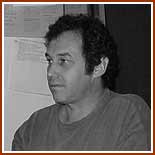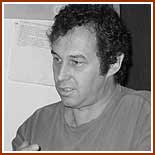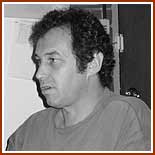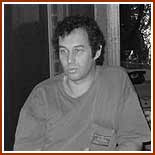 |
|
 "The training that we do has really changed; the trucks are better, the roads are better and our communications are better."  "Youíre always thinking about the best way to attack a fire. I guarantee you the fire that threatens the town will come from a direction you never thought about."  "At three in morning, if the wind is howling, you usually donít sleep. Youíre thinking 'God, I hope that wind dies down'; youíre sweating on the day and itís a worry."  "People say to me, 'If we call the fire brigade we expect them to turn up'. I say 'Well, so would I, but there is no guarantee you are going to get a fire truck'."  "City people arenít familiar with fire activity. They come up here to see beautiful trees, but are not aware there is a potential that the very next day it might all be black." |
Greg Head CFA captain of the fire brigade in Warburton  As the captain of the brigade, my primary responsibilities are safety of the members and to ensure that we keep the brigade in an efficient state for fire-fighting purposes. I also maintain an overall control of all the cash books; we do handle public money, so they have to be properly kept. As captain, I take control at fires if Iím there, and I have the power of the Chief Officer if there is no other senior officer there and make decisions on the direction of the brigade - where it should be headed. I also need to keep discipline and keep the brigade membersí morale up, basically. Itís easy for members to walk away when theyíre doing the same old thing all the time; like fire plug inspections, cleaning trucks and repairing hoses - really the fire-fighting part of it is very minor. I joined the brigade for social reasons at the start, so I could meet people. You live in a community and you donít know anyone, so that was the main reason, plus, my wifeís father was a member of Diamond Creek for 25 years and he finished up a week after Ash Wednesday. He said that was enough, but heís still in contact and has interest in whatís going on in the brigade and the CFA.  I have read Judge Leonard Strettonís report on the Black Friday fires and how the creation of the Country Fire Authority came about as a result of one of the recommendations in Judge Strettonís report. Iíve always had an interest in the areas that Iíve lived in and 1939 was one of the worst fires up here for this district in terms of the mills and the settlements. And then the training that we do equates back to what people were saying years ago about how to manage the bush. Nothing has really changed except you know, our understanding of fire is better, the trucks are better, the roads are better, the telecommunications are better and our protective clothing is better. I have read Judge Leonard Strettonís report on the Black Friday fires and how the creation of the Country Fire Authority came about as a result of one of the recommendations in Judge Strettonís report. Iíve always had an interest in the areas that Iíve lived in and 1939 was one of the worst fires up here for this district in terms of the mills and the settlements. And then the training that we do equates back to what people were saying years ago about how to manage the bush. Nothing has really changed except you know, our understanding of fire is better, the trucks are better, the roads are better, the telecommunications are better and our protective clothing is better.During the last bushfire season you do worry about a fire sweeping into the town and not having available crew members to help fight a fire. You mull it over in your mind at night and you usually donít sleep very well because of the heat as well as the potential fire danger. At three in the morning, if the wind is howling you usually donít sleep. Youíre thinking ďGod, I hope that wind dies downĒ, or, ďI hope itís not as hot as what it isĒ, and youíre sweating on the day, and itís a worry. Iím in contact via radio with whatís happening around the state and about whether or not crews might have to go away to fight fires in other areas. Itís mostly planning, you think about potential scenarios of where a fire could come from, always thinking about the best way to attack a fire. But I guarantee you; the fire that does start and threatens the town, is the one that you never thought about or the direction it would come from.  This year was a particular worry because of the dryness of the
southern slopes of Mount Donna Buang and Mount Victoria. They were at a point where they could have easily
burned and there are not many people around who can remember a fire up there or how to fight it. We donít really know what the fire behaviour is like in that area. We know what itís like if a fire starts on Mount Little Joe. It goes up the top and usually sweeps across the mountain range to the
south of the town but the townís got a lot more bush in it than it did 40 years ago. There are pockets of bush out the back of the fire station here, thereís about five acres of heavily-fuelled bush thatís a worry, and the river is like a fuse running through the middle of the town. This year was a particular worry because of the dryness of the
southern slopes of Mount Donna Buang and Mount Victoria. They were at a point where they could have easily
burned and there are not many people around who can remember a fire up there or how to fight it. We donít really know what the fire behaviour is like in that area. We know what itís like if a fire starts on Mount Little Joe. It goes up the top and usually sweeps across the mountain range to the
south of the town but the townís got a lot more bush in it than it did 40 years ago. There are pockets of bush out the back of the fire station here, thereís about five acres of heavily-fuelled bush thatís a worry, and the river is like a fuse running through the middle of the town.There is a lot of residents ringing you up and asking advice on the fire season. We organised three bushfire blitz meetings - well, we organised two and as a result of what happened in Canberra and Omeo, the pressure was on to have another meeting. At the first two meetings, that we called prior to Christmas, we had a total of about 80 people turn up. This is a pretty poor turnout really considering the publicity the fires were getting and the perceived fire danger and risks for the last fire season. And then when the fire season was on, we had 120 people turn up. They all wanted answers and I told them, ďI canít give you any answers on whatís going to happenĒ. I basically told them that they would have to look after themselves because I couldnít guarantee them a truck, I never can. CFA members have work commitments and family commitments and Iíve always maintained that they come first. People say, ďIf we call the fire brigade, we expect them to turn upĒ, and I say, ďWell, so would I, but there is no guarantee that you are going to get a fire truckĒ.  At the last group meeting, talking about the fires, Warburton was potentially under threat within three days, if weíd had high north-east winds. It was going to come in the back here from the north-east, from the Dargo area. It potentially would have swept through the Upper Yarra catchments area, through the Thompson and Upper Yarra and come in the back door at Warburton. At the last group meeting, talking about the fires, Warburton was potentially under threat within three days, if weíd had high north-east winds. It was going to come in the back here from the north-east, from the Dargo area. It potentially would have swept through the Upper Yarra catchments area, through the Thompson and Upper Yarra and come in the back door at Warburton.At that time the fire was spotting 80km ahead of the fire front, that puts it right here. I actually had the regional officer ring me and ask me to identify assets that I thought needed protecting here in Warburton in the event of a fire coming this way. I asked him the reason why, and he said that potentially the fire was going to be in Warburton in three days given the right conditions. The assets we identified were the telephone exchange, the shopping strip, bridges, guest houses, the retirement homes, schools, public halls and buildings that would warrant a truck sitting in front of them just in case to protect them. The accommodation houses were a worry because people arenít familiar with fire activity or even the risk of a fire in the area and they come up here to see beautiful trees, but they are not even aware that there is a potential that the very next day it might all be black. Read more about how they battled bushfires at Warburton in 1939 in the Oral History Section Read more about how they battled bushfires in Warburton in 1939 in the Map section |
The FireFighters
Len Foster
Chairman and CEO of the Australasian Fire Authorities Council Gary Morgan Chief Fire Officer for the Department of Sustainability and the Environment Russell Rees CFA Chief Officer Allan Marks CFA Group Officer for the Dandenong Ranges Fire Brigade Group Greg Head CFA Captain of the fire brigade in Warburton John Rigby Coordinating chaplain for the Country Fire Authority Mike Leonard Manager of Strategic Planning - Fire Management, at the Department of Sustainability and Environment John Masterton Burns surgeon. Head of the Burns Unit at the Alfred Hospital from 1967 - 1996. |
 |